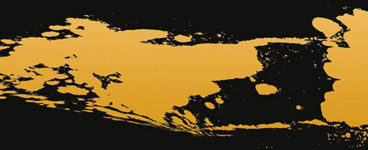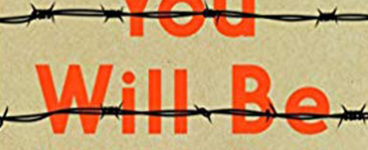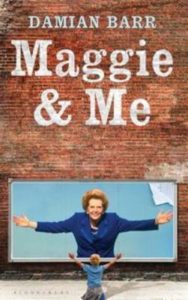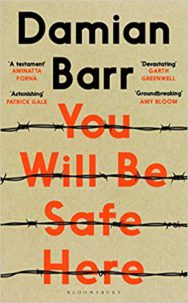‘Her eyes, smudges of no-run mascara, brim with her boy. When did he get so big? Will this place fix him?’
It always makes us happy at BooksfromScotland when a much-anticipated debut novel is finally released! Damian Barr’s You Will Be Safe Here has been generating buzz for months, and Lee Randall finds that the buzz is more than justified.
You Will Be Safe Here
By Damian Barr
Published by Bloomsbury
Appalled by the death of Raymond Buys, killed in a camp designed to “make men out of boys,” Damian Barr investigated South Africa’s culture of toxic masculinity—all the way back to the Boer War.
His discoveries inspired You Will Be Safe Here. It’s a world away from the classic debut, an autobiographical first novel, rendered unnecessary by his bestselling memoir, Maggie & Me, which told that story beautifully. Thematically, however, they harmonise in obvious and also surprising ways, leading Barr to speculate, “I wonder if every single book I ever write will essentially be about mothers and sons and survival?”
Two short sections bracket the meat and potatoes of his story, which begins in 1901, with the diary of Mrs Sarah van der Watt, who’s keeping the farm ticking over while husband Samuel is away fighting. Sarah has an ear to the ground, aware that the British are coming to turf them out. Her entries are a poignant attempt to stay close to her beloved husband, and to process new experiences as they unfold.
Early entries feel more for our benefit than Samuel’s: Sarah describes things about herself and the marriage that her partner of a decade surely knows. But Barr settles into his stride once the British arrive, remaining confidently in control of the material thereafter.
When Sarah refuses to swear allegiance to Britain, soldiers cart away her furniture, kill the animals and torch the farmhouse and buildings. Barr writes, “Scorched Earth policy was supposedly intended to cut off support to men fighting on commando, but the real aim was to break Boer morale by forcing their women and children onto the open veldt or concentrating them into camps.”
Things go from awful to harrowing in the Bloemfontein Refugee Camp, whose commander says, “You are not prisoners here. You are refugees. We are concentrating you all in camps like this for your own safety and at great expense. . . . Please be assured you will be safe here.”
They are anything but. The novel doesn’t stint on gut-wrenching descriptions, but here, and in later sections, Barr chooses his details judiciously, conveying horror without descending into torture porn.
He excels at depicting psychological abuse, such as the British removing their soap, then calling the increasingly filthy Afrikaners vermin. It’s one of many reminders that when you dehumanise people, when you “other” them, you allow yourself to ignore their suffering—and your culpability.
Like all abusers, the British excel at transferring blame to their victims: “Your husbands have abandoned you and your children forcing us to feed and house you and provide you with the modern medicine and schooling you so obviously lack. All at the expense of the generous British taxpayer.”
Next the action jumps to 1976 Johannesburg, introducing sixteen-year-old Rayna, whose life is upturned by a rape that leaves her pregnant, prompting a hasty marriage before her son’s birth. She also has a daughter with a married lover, but raises the children alone.
Daughter Irma goes on to have a son called Willem, born on the day apartheid ends, who becomes the focus of the book. Softer and more sensitive than other boys, he defies machismo expectations, though whether or not he’s gay—“moffie,” in South African slang—is irrelevant. Barr’s real interest is highlighting the plight of outsiders in a culture of bullies—one of whom is Irma’s new partner, Jan, a security guard with white supremacist leanings.
South Africa changes rapidly in the novel’s second half, when Mandela goes from prison to president. Barr reveals rising anxiety among the white population through an accretion of domestic details, showing them effectively imprisoning themselves. People carry weapons; buy guard dogs; drive short distances, rather than walk; build walls, then equip them with razor wire and electrified gates; and never, ever stop on the road, “even if it’s a cop car. You go somewhere with CCTV and witnesses.”
After an escalating series of confrontations, Jan persuades Irma to send Willem away, bringing us to the third prison of You Will Be Safe Here, the New Dawn Camp, whose chilling motto is “Freedom, Power, Purity.” Here, boys must speak Afrikaans, may not drink, smoke, or use mobile phones. Above all, there must be no outside opinions or independent thinking, for “Information is ammunition.” Conditions here echo the brutality Sarah endured—then worsen.
Anyone unschooled in South African history, or Britain’s tactics during the Boer Wars, will come away from You Will Be Safe Here with the beginnings of an education. While the novel is set in South Africa, and partly in the past, its message is pertinent for every country struggling with identity, with “otherness,” and with the erosion of tolerance and compassion. In other words, all of us, right here, right now.
We have only to look at the rise and rise of the far right, with its roots in the myth of white genocide, to ongoing abuse levelled at the LGBTQ community and the rows about what is and is not fit subject matter for British school children, to the status of women, and at our appalling treatment of immigrants and refugees, to understand that the dangers described in this novel have not been eradicated.
Barr’s potent message is delivered in the smartest way possible, by enmeshing us in the lives of characters we relate to, allowing us to see the world through their eyes.
You Will Be Safe Here by Damian Barr is published by Bloomsbury, priced £16.99
ALSO IN THIS ISSUE

 David Robinson Reviews: Tiger by Polly Clark
David Robinson Reviews: Tiger by Polly Clark
‘Rule one: when playing with a tiger, do not struggle.’

 Lee Randall Reviews: You Will be Safe Here by Damian Barr
Lee Randall Reviews: You Will be Safe Here by Damian Barr
‘Her eyes, smudges of no-run mascara, brim with her boy. When did he get so big? Will this place fix …














